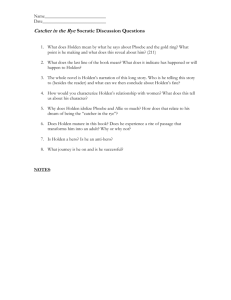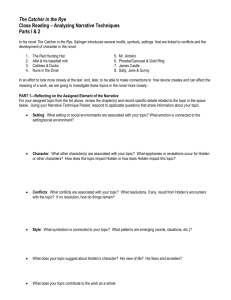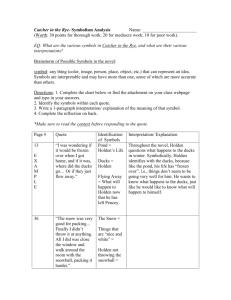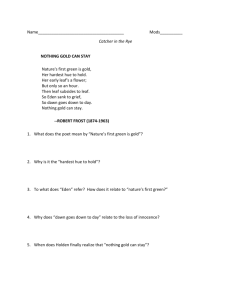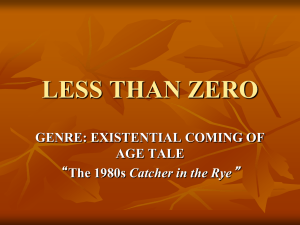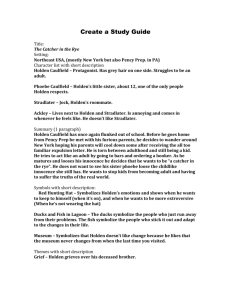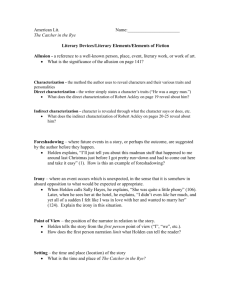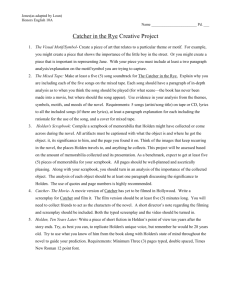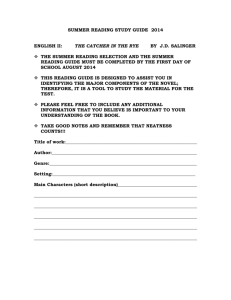"Catcher in the Rye" & "Comin' Thro' the Rye" Analysis
advertisement
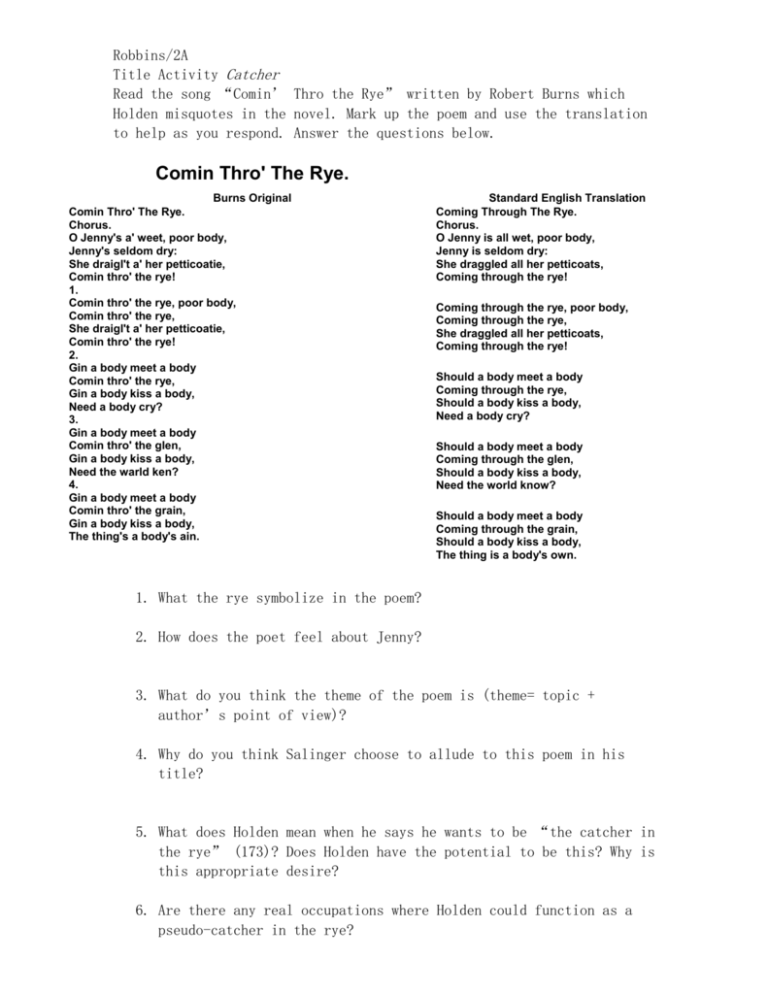
Robbins/2A Title Activity Catcher Read the song “Comin’ Thro the Rye” written by Robert Burns which Holden misquotes in the novel. Mark up the poem and use the translation to help as you respond. Answer the questions below. Comin Thro' The Rye. Burns Original Comin Thro' The Rye. Chorus. O Jenny's a' weet, poor body, Jenny's seldom dry: She draigl't a' her petticoatie, Comin thro' the rye! 1. Comin thro' the rye, poor body, Comin thro' the rye, She draigl't a' her petticoatie, Comin thro' the rye! 2. Gin a body meet a body Comin thro' the rye, Gin a body kiss a body, Need a body cry? 3. Gin a body meet a body Comin thro' the glen, Gin a body kiss a body, Need the warld ken? 4. Gin a body meet a body Comin thro' the grain, Gin a body kiss a body, The thing's a body's ain. Standard English Translation Coming Through The Rye. Chorus. O Jenny is all wet, poor body, Jenny is seldom dry: She draggled all her petticoats, Coming through the rye! Coming through the rye, poor body, Coming through the rye, She draggled all her petticoats, Coming through the rye! Should a body meet a body Coming through the rye, Should a body kiss a body, Need a body cry? Should a body meet a body Coming through the glen, Should a body kiss a body, Need the world know? Should a body meet a body Coming through the grain, Should a body kiss a body, The thing is a body's own. 1. What the rye symbolize in the poem? 2. How does the poet feel about Jenny? 3. What do you think the theme of the poem is (theme= topic + author’s point of view)? 4. Why do you think Salinger choose to allude to this poem in his title? 5. What does Holden mean when he says he wants to be “the catcher in the rye” (173)? Does Holden have the potential to be this? Why is this appropriate desire? 6. Are there any real occupations where Holden could function as a pseudo-catcher in the rye? Robbins/2A Title Activity Catcher Read the song “Comin’ Thro the Rye” written by Robert Burns which Holden misquotes in the novel. Mark up the poem and use the translation to help as you respond. Answer the questions below. THE SOCRATIC SEMINAR Socratic seminar is a teaching method modeled after the teaching style of the famous Greek teacher and philosopher Socrates. Socrates believed that deep, inquiring discussion, leading to “discovery” of answers, is a superior method of learning than traditional lecture models. Therefore, in a Socratic seminar, participants sit in a circle to discuss and discover meaning in a work through the use of open-ended guiding questions and firm textual support. DURING A SOCRATIC SEMINAR, YOU ARE RESPONSIBLE FOR: Being prepared by having read the text thoroughly and reflectively, marked key passages for easy reference, and preparing good notes of ideas you can introduce during the discussion Doing your best to participate (but not over-participate) in the discussion Offering your opinion clearly and briefly Pausing to think before you respond Being courteous and respectful of your peers Listening patiently and attentively to the discussion Maintaining an open mind with regard to the statements of others and the flexibility of your own thinking Avoiding repetition by demonstrating good listening skills Taking good notes during the discussion to demonstrate your active involvement in it Asking questions about what you have read Asking for clarification of complex or confusing passages Searching for connections with previous readings or knowledge Only making judgments you can defend with textual evidence Explaining your ideas through references to textual evidence Efficiently locating facts and examples in the text for evidence Robbins/2A Title Activity Catcher Read the song “Comin’ Thro the Rye” written by Robert Burns which Holden misquotes in the novel. Mark up the poem and use the translation to help as you respond. Answer the questions below. Listening critically and questioning inaccuracies or illogical reasoning Lending support to the arguments of others Moving the seminar forward to new concepts SOCRATIC SEMINAR RUBRIC “A” students: are thoroughly familiar with the text and have come prepared with notes and marked pages show initiative by asking for clarification of others’ comments, bringing new people into the conversation, moving the conversation forward to new ideas and topics direct their comments to all participants (not just to the teacher) avoid talking too much or too long cite specific evidence from the text or elsewhere pay attention to details, and take notes on the discussion build their comments off those of others, contributing to the flow of conversation point out inaccurate information or false logic, in a respectful way maintain concentration by overcoming distractions and minimizing tangents demonstrate familiarity with the text by ability to find specific passages efficiently “B” students have read the text and come with notes, questions and ideas regarding it generally pays attention and responds thoughtfully to ideas and questions of other participants and the teacher address the teacher primarily may seem to engage in “taking my turn” responses rather than natural progressions comments indicate some thought to text , but not appreciation of subtler points comments are logical but may not make connections among ideas of previous speakers may become too absorbed with own ideas and distracted by own opinions may become distracted, but immediately return to focus rely more on plot paraphrasing than motivations and ideas “C” Students little evidence of being prepared may make some insightful comments, but do not contribute much to the discussion tend to debate rather than discuss respond to some questions but have to be prodded comments reflect that the student has read the text, but are not very insightful comments may not contribute to flow of the discussion takes few notes during the seminar finds the comments of others unimportant appears to have skimmed the text only Robbins/2A Title Activity Catcher Read the song “Comin’ Thro the Rye” written by Robert Burns which Holden misquotes in the novel. Mark up the poem and use the translation to help as you respond. Answer the questions below. key concepts are misunderstood “D” Students arrive unprepared, without the text or notes display little respect for the discussion take advantage of minor distractions do not participate or make illogical comments are uninvolved in the discussion, as demonstrated by posture and lack of note-taking Catcher Wrap Up Socratic Seminar Questions The visit with Mr. Antolini What advice does Mr. Antolini give Holden (187-190)? What does Mr. Antolini write on a piece of paper (188)? Do you agree? How does this apply to another character mentioned earlier in the book? What was your reaction to the “incident” between Mr. Antolini and Holden (191-2)? Was he being perverted or trying to be comforting? What does Mr. Antolini think Holden is headed for (186)? Is Antolini correct? Consider where Holden is telling his story from (reread the first page). To leave or not? Reread page 198. What is Holden asking Allie? Why? How does his desire connect to his discussion with Sally Hayes (132-3)? Salinger is a recluse and declines interviews, etc. Do you see a connection between Holden and Salinger? The Museum What continues to upset Holden as he walks around the museum? Why is it so upsetting to him (201-4)? How does this relate to Holden’s previous thoughts about the museum (121-2) and his desire to be the catcher in the rye? The Title What is the relationship between “Comin Thru’ the Rye” and Catcher in the Rye? How are Holden and Jenny alike? Provide specific examples form the novel and the poem. The Ending What might Holden’s hat symbolize (212)? (Consider the kind of hat it is, what Holden has been searching for, and perhaps what he “finds” when he is with Phoebe.) What is important about the scene when Holden watches Phoebe on the carrousel? Where is Holden telling his story from and do you feel he belongs here? At the end of the novel, do you think Holden has come to terms with his family and himself? Explain. What do you think will happen to Holden now?
